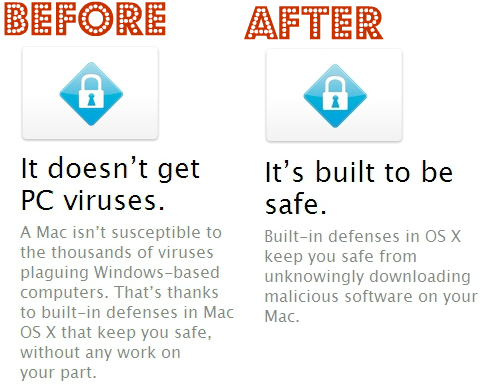Apple Quietly Changes Erroneous Claims Of OS X's Invincibility
For years, Apple has propogated the myth that its computers were inherently secure thanks to its BSD roots, inherently better security management, or because Steve Jobs sacrificed puppies under the new moon to keep your platform safe. This created a dangerous perception that Macs were immune to viruses, trojans, or man-in-the-middle attacks. In reality, Apple has always benefited from security through obscurity -- when 90% or more of the world runs on PCs, PCs are the platforms hackers target.
Apple has now quietly acknowledged this fact with a few judicious updates to its Max OS X page. The first change is to the side bar, where Apple's TL,DR benefit explanation is posted.

We've gone from flat statements "It doesn't get PC viruses" to more accurate "It's built to be safe." This is a positive change, and a recognition of an underlying fact -- the gap between "PC virus" and "Mac Virus" isn't as broad as it used to be. Both are built on x86 processors, which means exploits that attack things like Java (as happened earlier this year) can take advantage of broad CPU compatibility. Here's the other change, with the original text on top and the altered text on bottom.

Again, note the difference between "You don't have to care at all!" to "Hey, we built a solid product." Far from thumbing our nose at Apple, these are good, long-overdue changes for the company to make. Apple users need to be aware that the company's success and high profile makes it a more tempting target for anyone looking to make a name for themselves in the industry.
One of the most significant findings of the Flashback Trojan breakout from a few months back is that Apple was aware of the problem for months before it chose to issue a patch. This is where the company needs to swallow its pride and copy a page from Microsoft's book. Redmond has had no choice but to adopt a rapid-response policy when exploits hit the 'Net. More often than not, Windows virus outbreaks are caused by patches not being applied rather than by Microsoft having failed to develop a solution. the entire "Patch Tuesday" model is something Apple will need to adopt.
Still, changing its rhetoric is the first step to teaching its customers how to protect themselves and what to watch out for. Ironically, this could prove to be something of a problem. PC users, much like Microsoft, have had no choice but to learn some basic skills regarding online protection (even if they haven't learned them very well.) Apple users who adopted the platform rather than learning to navigate the river may find themselves dumped in the proverbial creek in a few more years -- without a paddle.*
(Should you know an Apple user in need an aquatic locomotion device, I know several enterprising individuals in Nigeria who'd be happy to sell them one.)
Apple has now quietly acknowledged this fact with a few judicious updates to its Max OS X page. The first change is to the side bar, where Apple's TL,DR benefit explanation is posted.

We've gone from flat statements "It doesn't get PC viruses" to more accurate "It's built to be safe." This is a positive change, and a recognition of an underlying fact -- the gap between "PC virus" and "Mac Virus" isn't as broad as it used to be. Both are built on x86 processors, which means exploits that attack things like Java (as happened earlier this year) can take advantage of broad CPU compatibility. Here's the other change, with the original text on top and the altered text on bottom.

Again, note the difference between "You don't have to care at all!" to "Hey, we built a solid product." Far from thumbing our nose at Apple, these are good, long-overdue changes for the company to make. Apple users need to be aware that the company's success and high profile makes it a more tempting target for anyone looking to make a name for themselves in the industry.
One of the most significant findings of the Flashback Trojan breakout from a few months back is that Apple was aware of the problem for months before it chose to issue a patch. This is where the company needs to swallow its pride and copy a page from Microsoft's book. Redmond has had no choice but to adopt a rapid-response policy when exploits hit the 'Net. More often than not, Windows virus outbreaks are caused by patches not being applied rather than by Microsoft having failed to develop a solution. the entire "Patch Tuesday" model is something Apple will need to adopt.
Still, changing its rhetoric is the first step to teaching its customers how to protect themselves and what to watch out for. Ironically, this could prove to be something of a problem. PC users, much like Microsoft, have had no choice but to learn some basic skills regarding online protection (even if they haven't learned them very well.) Apple users who adopted the platform rather than learning to navigate the river may find themselves dumped in the proverbial creek in a few more years -- without a paddle.*
(Should you know an Apple user in need an aquatic locomotion device, I know several enterprising individuals in Nigeria who'd be happy to sell them one.)

